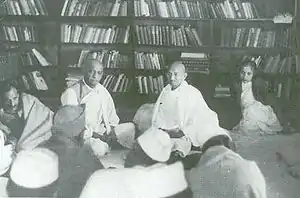Congress Working Committee
The Congress Working Committee (CWC) is the executive committee of the Indian National Congress. It was formed in December 1920 at Nagpur session of INC which was headed by C. Vijayaraghavachariar. It typically consists of fifteen members elected from the All India Congress Committee. It is headed by the Working President.

| This article is part of a series on the |
| Indian National Congress |
|---|
| About |
| Committees |
| Frontals |
The Working Committee has had different levels of power in the party at different times. In the period prior to independence in 1947, the Working Committee was the centre of power, and the Working President was frequently more active than the Congress President. In the period after 1967, when the Congress Party split for the first time (between factions loyal to Indira Gandhi and those led by the Syndicate of regional bosses including Kamaraj, Prafulla Chandra Sen, Ajoy Mukherjee, and Morarji Desai), the power of the Working Committee declined; but Indira Gandhi's triumph in 1971 led to a re-centralisation of power away from the states and the All-India Congress Committee and caused the Working Committee in Delhi to once again be the paramount decision-making body of the party.[1] The centralised nature of Congress decision making has since caused observers in the states to informally describe instructions from Delhi as coming from the "High Command".
Composition
President
| Member | Position in government |
|---|---|
| Sonia Gandhi | Member of Parliament |
Members[2]
| Member | Position in government |
|---|---|
| Rahul Gandhi | Member of Parliament |
| Priyanka Gandhi Vadra | Congress General Secretary |
| Manmohan Singh | Member of Parliament, Former Prime Minister of India |
| Mallikarjun Kharge | Member of Parliament |
| Ghulam Nabi Azad | Leader of the Opposition, Rajya Sabha |
| A. K. Antony | Member of Parliament |
| Ambika Soni | Member of Parliament |
| Anand Sharma | Member of Parliament |
| Harish Rawat | Former Chief Minister of Uttarakhand |
| K.C Venugopal | Member of Parliament |
| P. Chidambaram | Member of Parliament |
| Mukul Wasnik | Ex Union Minister |
| Oommen Chandy | Former Chief Minister of Kerala |
| Ajay Maken | Former Member of Parliament |
| Jitendra Singh | Former Union Minister |
| Tariq Anwar | Former Member of Parliament |
| Randeep Surjewala | Former Member of Legislative Assembly, Haryana |
| Gaikhangam Gangmei | Former Deputy Chief Minister, Manipur |
| Raghuveer Meena | Former Member of Parliament |
| Tarun Gogoi | Former Chief Minister of Assam |
Permanent Invitees
| Member | party Position |
|---|---|
| Digvijaya Singh | MP |
| Meira Kumar | Former Speaker of Lok Sabha |
| Adhir Ranjan Chowdhury | MP |
| Jairam Ramesh | MP |
| Salman Khurshid | Ex MP |
| Avinash Pandey | |
| K. H. Muniyappa | Ex MP |
| Pramod Tiwari | MP |
| Tariq Hameed Karra | Ex MP |
| Pawan Kumar Bansal | Ex MP |
| Rajni Patil | Ex MP |
| P. L. Punia | MP |
| R. P. N. Singh | Ex Union Minister |
| Shaktisinh Gohil | MP |
| Rajiv Satav | MP |
| Rajeev Shukla | Ex MP |
| Jitin Prasada | Ex MP |
| Dinesh Gundu Rao | MLA |
| Manicka Tagore | MP |
| A. Chellakumar | MP |
| H. K. Patil | MLA |
| Devender Yadav | Ex MLA |
| Vivek Basnal | |
| Manish Chatrath | |
| Bhakta Charan Das | Ex Union Minister |
| Kuljit Singh Nagra |
Special Invitees
| Member | party Position |
|---|---|
| Depender Hooda | MP |
| Kuldeep Bishnoi | MLA |
| Chinta Mohan | Ex-MP |
| Sachin Rao Incharge | Training |
| Sushmita Dev | President, AIMC |
| Lalji Desai | Chief Organiser ,Seva Dal |
| G. Sanjeeva Reddy | President, INTUC |
| Neeraj Kundan | President, NSUI |
| Srinivas BV | President, IYC |
Criticism
The Congress has not held internal elections to CWC for nearly 20 years and last elections were held in 1998.[5] In 2017 Election Commission ordered it to hold internal elections[6] but as of 2020 no elections were held.[7] When Congress was trying to forge an alliance with ideologically opposite Shiv Sena in Maharashtra in 2019, Congress leader Sanjay Nirupam publicly urged Sonia Gandhi to dissolve the CWC, saying "they cannot be trusted anymore."[8] Ever since Rahul Gandhi's resignation as party president in July 2019, there is persistent confusion over whether he continues to be a CWC member or not.[9] A paper by Observer Research Foundation calls a large number of CWC members "unprincipled, opportunists and self-serving individuals for whom self-interest is paramount."[10]
References
- "Towards a More Competitive Party System in India", Ram Joshi and Kirtidev Desai, Asian Survey, Vol. 18, No. 11. (Nov., 1978), pp. 1091-1116.
- https://www.inc.in/en/congress-working-committee/members
- https://www.inc.in/en/congress-working-committee/permanent-invitees
- https://www.inc.in/en/congress-working-committee/special-invitees
- "Nobody But Rahul, Says Congress Leader Whose Father Ran vs Sonia Gandhi". Archived from the original on 12 August 2019. Retrieved 23 August 2020.
- "Election Commission Tells Congress to Hold Internal Elections by June 30". Retrieved 23 August 2020.
- Pankaj Vohra (8 August 2020). "EC can freeze Congress symbol or initiate action if party remains leaderless". Retrieved 23 August 2020.
- https://web.archive.org/web/20200206174034/https://www.ndtv.com/india-news/congress-defamed-rahul-gandhi-should-return-to-lead-sanjay-nirupam-after-maharashtra-twist-2137334
- https://web.archive.org/web/20200226123542/https://www.news18.com/news/politics/old-grudge-unfulfilled-demands-why-rahul-gandhi-remained-absent-from-congresss-meet-on-delhi-riots-2516309.html
- https://web.archive.org/web/20200314154627/https://www.orfonline.org/expert-speak/congress-moving-towards-extinction-54571/